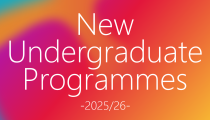
Jan 2025 Entry
What's New
The School of Optometry is one of the five academic units in the Faculty of Health and Social Sciences and is a research hub in Optometry with international recognition. The School focuses on two research areas, namely myopia and the ageing eye. The aim of our myopia research is to unravel the cellular mechanism of myopia and develop clinical interventions to prevent and halt its development and progression. Our ageing eye research focuses on understanding the physiological ageing processes leading to vision loss and the pathogenesis of age-related eye diseases including glaucoma, diabetic retinopathy and retinal degeneration.
The School invites high calibre students with evidence of academic excellence, research ability and good communication skills to apply for Doctor of Philosophy (PhD) and Master of Philosophy (MPhil) studies.
Please visit our website for more information about our research areas and programmes.
Ageing Eye Research
As people age, visual function often deteriorates and the risk of eye disorders and pathologies increases. Our goal is to find better ways to manage such eye conditions to preserve vision and independence. We are carrying out research in the following areas:
Dry eye and tear physiology
Glaucoma and aqueous humour dynamics
Ocular biomechanics
Retinal degeneration
Please click here to learn more about the research interests of our School of Optometry and contact our staff directly to discuss research opportunities.
Myopia Research
Myopia affects the majority of children in Hong Kong. It impacts on their quality of life and increases the risk of vision loss in later life. We are carrying out research to discover why myopia develops, ways to retard its development and approaches to minimise its impact on public health. To achieve this goal, staff members are undertaking research in the following areas:
Animal models
Clinical trials
Epidemiology
Genetics
Proteomics
Public health
Visual electrophysiology
Please click here to learn more about the research interests of our School of Optometry and contact our staff directly to discuss research opportunities.
Centre for Myopia Research
The Centre for Myopia Research conducts clinical, genomic and proteomic research using a multi-disciplinary approach, pulling in expertise from all areas of clinical and basic science. In the past few years, the Centre’s researchers have made significant discoveries in myopia control strategies such as novel lens designs and overnight corneal remodelling therapy. These results have led to further downstream developments and applications.
Optometry Research Clinic
The School established the Optometry Research Clinic in 2013 and it was brought into full operation for translational and clinical research in 2016. Four cubicles are equipped with standard sets of optometry equipment, and the remaining four cubicles are furnished with specialised instruments for optometry research related to advanced ophthalmic imaging of anterior and posterior eye segments; ocular motility and visual functions; dry eye and contact lenses; and advanced ophthalmic dispensing.
Other Major Research Facilities
Apart from the Centre for Myopia Research and the Optometry Research Clinic, the School has set up various laboratories such as the Visual Neuroscience Laboratory, Future Optometry Laboratory and Ocular Anatomy Laboratory, to expand the frontiers of our research.
Interested students are encouraged to approach our faculty members (click here for the list of staff) to discuss their research proposals.
Please address your enquiries to Departmental Research Committee Secretary (email: so.rpg@polyu.edu.hk).
Compulsory - Two Academic Referee's Reports are required.
Compulsory
Compulsory - A standard form must be used for the submission of research proposal. Please click here to download the form.
Compulsory
- Graduation certificate(s) - Applicants with academic qualifications from the Chinese Mainland must hold both the Degree Certificate (學位證書) and Graduation Certificate (畢業證書); and
- Transcript(s) - Show all the courses and grades taken during the whole study period with official stamps and contain all pages, including the explanatory notes and the grading system.
Remarks:
- (For graduates) Transcripts should be the latest version with the graduation date (or the issue date should match the graduation date).
- (For current study) Provide the latest transcript or testimonial issued by the institution.
- (For 3-year full-time/6-year part-time PhD admission) The transcript should show that “dissertation” or “thesis” was an award requirement for the Master’s degree. If not, provide an official document issued by the institution to certify that the applicant has a Master’s degree with a “dissertation” or “thesis” as an award requirement.
Optional - Publication records, scholarships, awards/prizes and class rankings (with supporting documents)
(Remark: The School of Optometry may approach the applicants to submit additional information/documents.)





